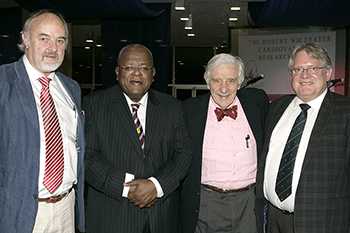Latest News Archive
Please select Category, Year, and then Month to display items
12 October 2020
|
Story Arina Engelbrecht
|
Photo Supplied
 Arina Engelbrecht from Organisational Development and Employee Well-being believes physical activity has a number of benefits for one’s health, including stress relief.
Arina Engelbrecht from Organisational Development and Employee Well-being believes physical activity has a number of benefits for one’s health, including stress relief.
Being physically active plays a big role in preventing the development of mental-health problems and in improving the quality of life of people experiencing mental-health problems.
Treatment for depression
Physical activity can be an alternative treatment for depression. It can be used as a stand-alone treatment or in combination with medication and/or psychological therapy. It promotes all kinds of changes in the brain, including neural growth, reduced inflammation, and new activity patterns are formed that promote feelings of calm and well-being. It releases endorphins – powerful chemicals in the brain that energise your spirit and make you feel good.
Physical activity can be very effective in relieving stress. Research in adults has found that physically active individuals tend to have lower stress levels compared to individuals who are less active. It also leads to improved sleep. When a person sleeps better and feels more rested, overall quality of life improves. They cope better with daily life stressors.
Reduce Alzheimer's risk
Regular physical activity can reduce your risk of developing Alzheimer's disease by up to 50%. It can also slow down further deterioration in those who have already started to develop cognitive problems. It stimulates the brain’s ability to maintain old connections as well as to make new ones.
A study asked people to rate their mood immediately after periods of physical activity (e.g. going for a walk/run, cycling, doing housework) and periods of inactivity (e.g. reading a book or watching television). Researchers found that participants felt more content, more awake, and calmer after being physically active compared to after periods of inactivity.
In conclusion, people who are physically active feel a sense of well-being, feel more energetic throughout the day, sleep better at night, have sharper memories, and feel more relaxed and positive about themselves and their lives.
“Being physically active not only changes your body, it changes your mind,
attitude, and your mood.” – Arina Engelbrecht
UFS Cardiovascular Research Centre a South African solution to continental crisis
2015-11-30

From left are: Dr Robert Kleinloog, president of the Society of Cardiothoracic Surgeons of South Africa, Prof Jonathan Jansen, Vice-Chancellor and Rector of the University of the Free State (UFS), Prof Robert Frater after which the Robert W M Frater Cardiovascular Research Centre was named and Prof Francis Smit, head of Cardiothoracic Surgery at the UFS, at the launch of the new centre.
Photo: Johan Roux |
“You don’t have to be in New York or any big city in the world to establish a cardiovascular centre that delivers work of world standards. I’ve learned that extraordinary things are achieved by ordinary people who apply themselves accordingly. This research centre is a South African solution to a continental challenge”.
These were the words of Prof Robert Frater at the opening of the new Robert W M Frater Cardiovascular Research Centre in the Department of Cardiothoracic Surgery at the University of the Free State (UFS) School of Medicine.
The centre, one of only two of the kind in the country, will focus on bioengineering and cardiovascular research. It was opened on Wednesday 18 November 2015 in the Francois Retief Building on the Bloemfontein campus.
The centre is named after Prof Robert W.M Frater in recognition of his vast contribution to the UFS. He is internationally recognised for his outstanding academic, clinical, and scientific contributions to cardiac surgery. Prof Frater has also been actively involved in research activities of the Department of Cardiothoracic Surgery for the last 10 years. In 2011, he received an honorary doctorate from the UFS.
Under the leadership of Prof Francis Smit, head of Cardiothoracic Surgery, the department has been described as a dynamic unit at the forefront of meeting the different changes in Southern Africa while maintaining an excellent clinical and academic track record.
At the opening, Prof Jonathan Jansen, Vice-Chancellor and Rector of the UFS, thanked Prof Frater for his presence at, involvement in, and support of the UFS. “I am looking forward to working in collaboration with the department to make this university a research centre of excellence in the continent”, he said.
The centre has existing endeavours already in operation, including Population projects, Clinical studies, and Clinical pathology, to name three. In collaboration with the Central University of Technology, the University of Stellenbosch, and Charite University of Berlin, among numerous others, the centre will be an appropriate help to an African challenge.
Its introduction promises advanced research outcomes with the potential to make the Department of Cardiothoracic Surgery a world-class competitor.